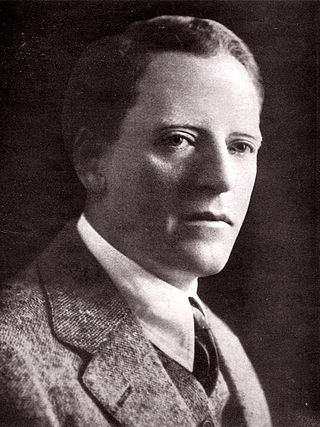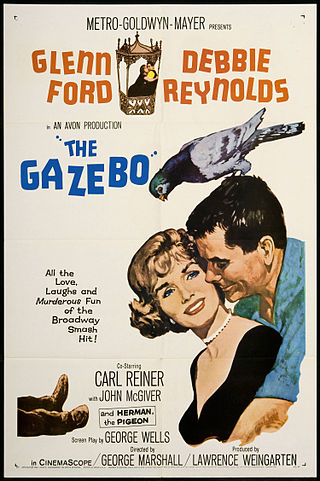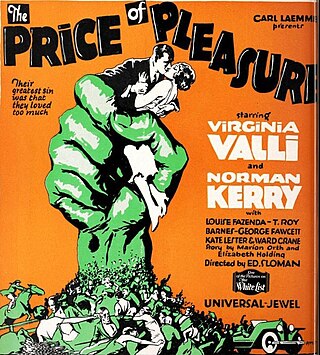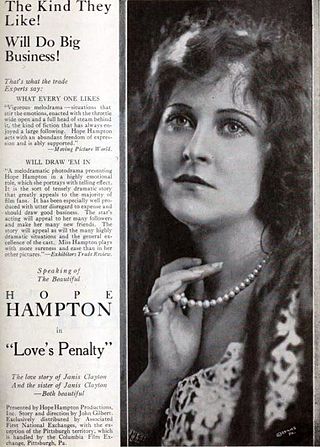
Human Wreckage is a 1923 American independent silent drama propaganda film that starred Dorothy Davenport and featured James Kirkwood, Sr., Bessie Love, and Lucille Ricksen. The film was co-produced by Davenport and Thomas H. Ince and distributed by Film Booking Offices of America, with a premiere on June 17, 1923. No print of this film is known to exist today, and it is considered a lost film.

James Cornelius Kirkwood Sr. was an American actor and director.

The Man From Home is a 1922 British drama film directed by George Fitzmaurice, adapted from a play of the same name by Booth Tarkington and Harry Leon Wilson. The story had been filmed before in 1914 by Cecil B. DeMille as The Man From Home. Alfred Hitchcock was credited as a title designer on the 1922 production. The film survives in Netherlands Filmmuseum Amsterdam. It was shown publicly in September 2015, possibly for the first time since the 1920s, during the British Silent Film Festival at Leicester.

Dorothy Greville Cumming was an actress of the silent film era. She appeared in 39 American, English, and Australian films between 1915 and 1929, notably appearing as the Virgin Mary in Cecil B. DeMille's 1927 film The King of Kings and the jealous wife in Lillian Gish's 1928 The Wind. She also appeared in stage productions in those same countries.

Smouldering Fires is a 1925 Universal silent drama film directed by Clarence Brown and starring Pauline Frederick and Laura La Plante. The movie's plot is similar to the 1933 talking picture Female, starring Ruth Chatterton.

Broken Barriers is a 1924 American silent drama film starring James Kirkwood, Norma Shearer, and Adolphe Menjou. Directed by Reginald Barker, the film is based upon the novel of the same name by Meredith Nicholson.

The Gazebo is a 1959 American black comedy CinemaScope film about a married couple who are being blackmailed. It was based on the 1958 play of the same name by Alec Coppel and directed by George Marshall. Helen Rose was nominated for the Academy Award for Best Costume Design, Black-and-White. According to MGM financial records, the film earned $1,860,000 in North America and $1,450,000 elsewhere, making a profit of $628,000. It is also the last film released by MGM in the 1950s.

The Snob is a 1924 American silent drama film directed by Monta Bell. The film starred Norma Shearer and John Gilbert, together with Phyllis Haver, Conrad Nagel, and Hedda Hopper. The film was written by Monta Bell, and was based on the novel The Snob: The Story of a Marriage by Helen Reimensnyder Martin.

Love is an extant American 1920 silent era romance drama film starring Louise Glaum, James Kirkwood, and Joseph Kilgour. Directed by Wesley Ruggles and produced by J. Parker Read, Jr., the screenplay was adapted by Louis Joseph Vance based on a story by Carol Kapleau.
The Next Corner is a 1924 American silent romantic melodrama film directed by Sam Wood. The film starred Dorothy Mackaill and Lon Chaney. Based on the romance novel of the same name by Kate Jordan, the film was produced by Famous Players–Lasky and distributed by Paramount Pictures.

Kitty is a 1929 British drama film directed by Victor Saville and starring Estelle Brody and John Stuart. The film was adapted from the 1927 novel of the same name by Warwick Deeping and marked the third co-star billing of Brody and Stuart, who had previously proved a very popular screen pairing in Mademoiselle from Armentieres (1926) and Hindle Wakes (1927).

A Wise Fool is a 1921 American silent drama film produced by Famous Players–Lasky and released by Paramount Pictures. This film is based on the novel The Money Master by Sir Gilbert Parker and was directed by George Melford. James Kirkwood is the star of the film. A copy is held at the Library of Congress.

The Price of Pleasure is a 1925 American silent drama film directed by Edward Sloman and starring Virginia Valli, Norman Kerry, and Louise Fazenda.

The Country Flapper is a 1922 American silent comedy film directed by F. Richard Jones and starring Dorothy Gish, Glenn Hunter and Tom Douglas. The film is based on "The Cynic Effect," a short story by Nalbro Bartley.

The Grim Comedian is a 1921 American silent drama film directed by Frank Lloyd and starring Phoebe Hunt, Jack Holt, and Gloria Hope.

After Business Hours is a 1925 American silent drama film directed by Malcolm St. Clair and starring Elaine Hammerstein, Lou Tellegen, and Phyllis Haver.

Love's Penalty is a 1921 American drama film written and directed by John Gilbert. The film stars Hope Hampton, Irma Harrison, Mrs. Phillip Landau, Percy Marmont, John B. O'Brien, and Virginia Valli. The film was released in June 1921, by Associated First National Pictures.

The Whispered Name is a 1924 American silent drama film directed by King Baggot and starring Ruth Clifford, Charles Clary, and W.E. Lawrence. It was based on a Broadway play that had previously been made into the 1917 film The Co-Respondent.

Lover's Island is a 1925 American silent drama film directed by Henri Diamant-Berger and starring Hope Hampton, James Kirkwood, and Louis Wolheim.

The Dancing Cheat is a 1924 American silent drama film directed by Irving Cummings and starring Herbert Rawlinson, Alice Lake, and Robert Walker.



















